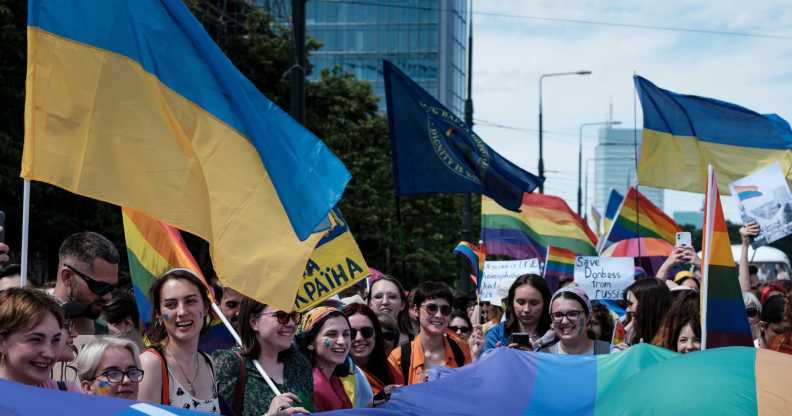Ukrainian MP submits bill to legally recognise same-sex partnerships: ‘There is no time for hesitation’

A bill has been proposed which could see same-sex partnerships legalised in Ukraine (Piotr Lapinski/NurPhoto via Getty Images)
A Ukrainian MP has put forward a bill calling for same-sex partnerships to be legally recognised in the war-torn country.
The legislation was introduced by Inna Sovsun, a member of Ukraine’s liberal party Holos.
Sovsun was elected to Ukraine’s parliament, the Verkhovna Rada, in 2019, alongside 19 other Holos politicians, making it the smallest opposition party.
Sharing the news that she had submitted the draft bill, in a thread of tweets on Tuesday (7 March), the MP cited statistics which suggest that “56 per cent of Ukrainians support same-sex partnerships”.
She hopes both the parliament and the president, Volodymyr Zelenskyy, will be led by that.
The proposed legislation comes just days after two KyivPride staff members said the Ukrainian-Russian conflict had unexpectedly resulted in the wider acceptance of LGBTQ+ people in the country.
Speaking to the Press Association, Olha Onipko said: “A lot of people understand that such things like sexual orientation or gender identity are not very important when you’re saved by these people.”
Outlining her reasons for putting the bill forward, Sovsun continued: “Every day, Ukrainian LGBT military personnel put themselves in danger, protecting us. Yet, if they are in relationships, the state does not recognise those. This means that their partners do not have the same benefits as [those] in heterosexual relationships.
“This includes some very unsettling situation[s]. If [an] LGBT military person is wounded, his/her partner would not be able to make decisions about medical treatment.”
Sovsun also referred to a petition launched last year which called for marriage equality to be introduced in the country.
In August, Zelenskyy responded to the petition, which was signed by thousands of people, and, according to CNN, said he would work with the government to ensure “all people are free and equal in their dignity and rights”.
As PinkNews reported at the time, Zelenskyy confirmed that he will ask the government to look into legalising same-sex marriage but not until after the war with Russia ends.
In the thread, Sovsun noted that the government seemed to be “in no hurry” to bring in the changes, so she decided to submit a draft law to speed up the process.
“Ukrainians can no longer wait for equality,” she wrote. “We must do it immediately. LGBT Ukrainians deserve to have a family. Every day can be their last. Just like for any other Ukrainian. There is no time for hesitation. Let’s legalise same-sex partnerships in Ukraine this year.”
When a Twitter user suggested Ukrainian politicians should focus on “shooting the bear” first, in reference to the war against Russia, KyivPride responded saying: “The ‘bear’ is shooting Ukrainians while we speak, so it would be great to have equal rights for all defenders of the country.”
Ukraine has not had the best record on LGBTQ+ rights
While homosexuality has been legal in Ukraine since 1991 – the year the nation declared independence from the Soviet Union – the LGBTQ+ community has faced continued social and political prejudice.
Unlike its geographical neighbour, Russia, Ukraine does not have any censorship laws relating to LGBTQ+ topics. Trans people can legally change their gender, although non-binary identities are not recognised, and discrimination against LGBTQ+ people is illegal in some contexts.
Despite these protections, research by advocacy group ILGA Europe shows there were hundreds of incidents of harassment and violence against LGBTQ+ people and activists.
While same-sex marriage may not be legal or recognised, and conversion therapy is not banned, over the years support for, and visibility of, the LGBTQ+ community has grown.
Research by numerous groups suggests that support is rapidly growing for equal rights in Ukraine, with the data from the Institute of Sociology of the National Academy of Sciences of Ukraine suggesting support for same-sex partners has almost doubled since 2013.

